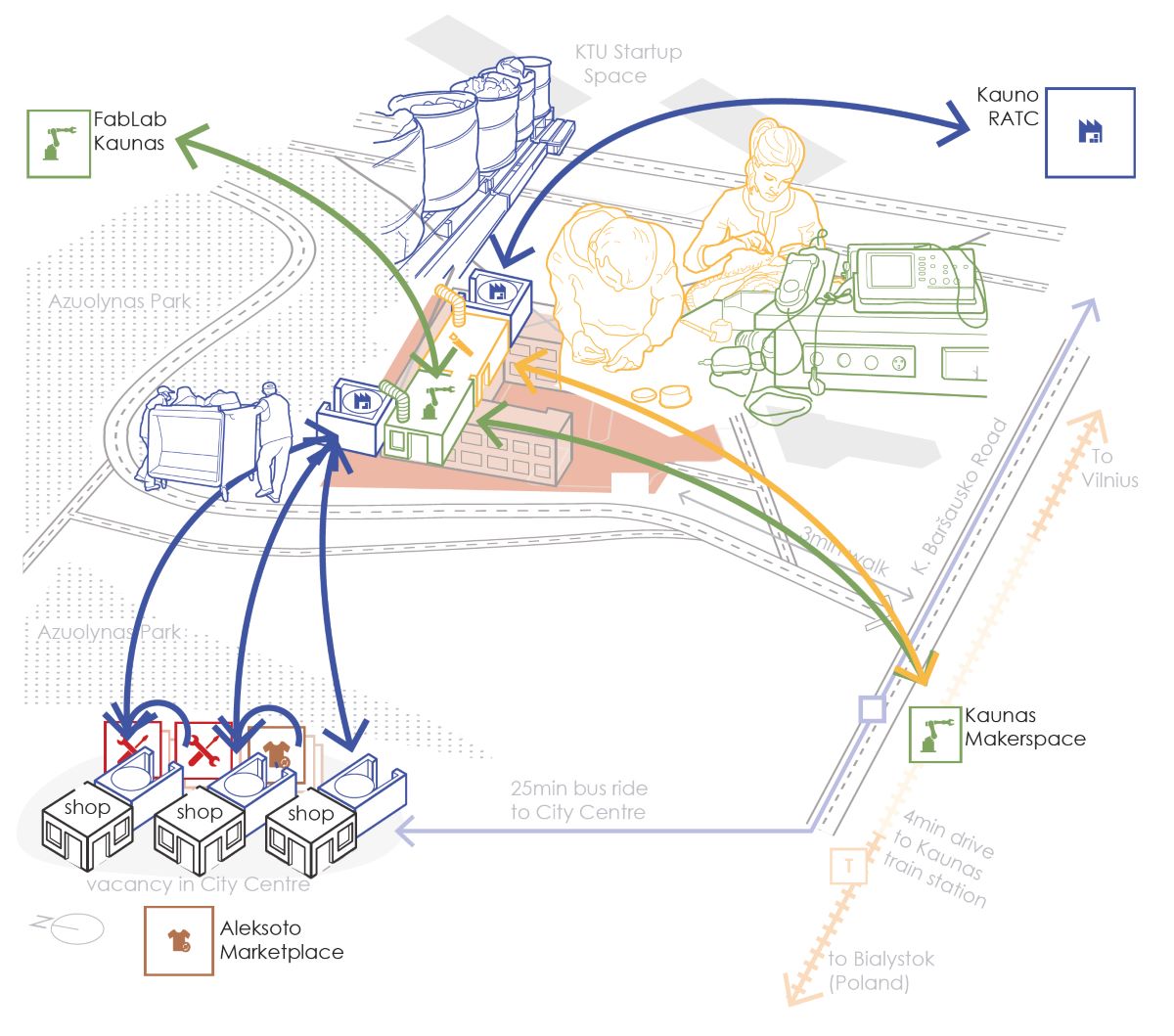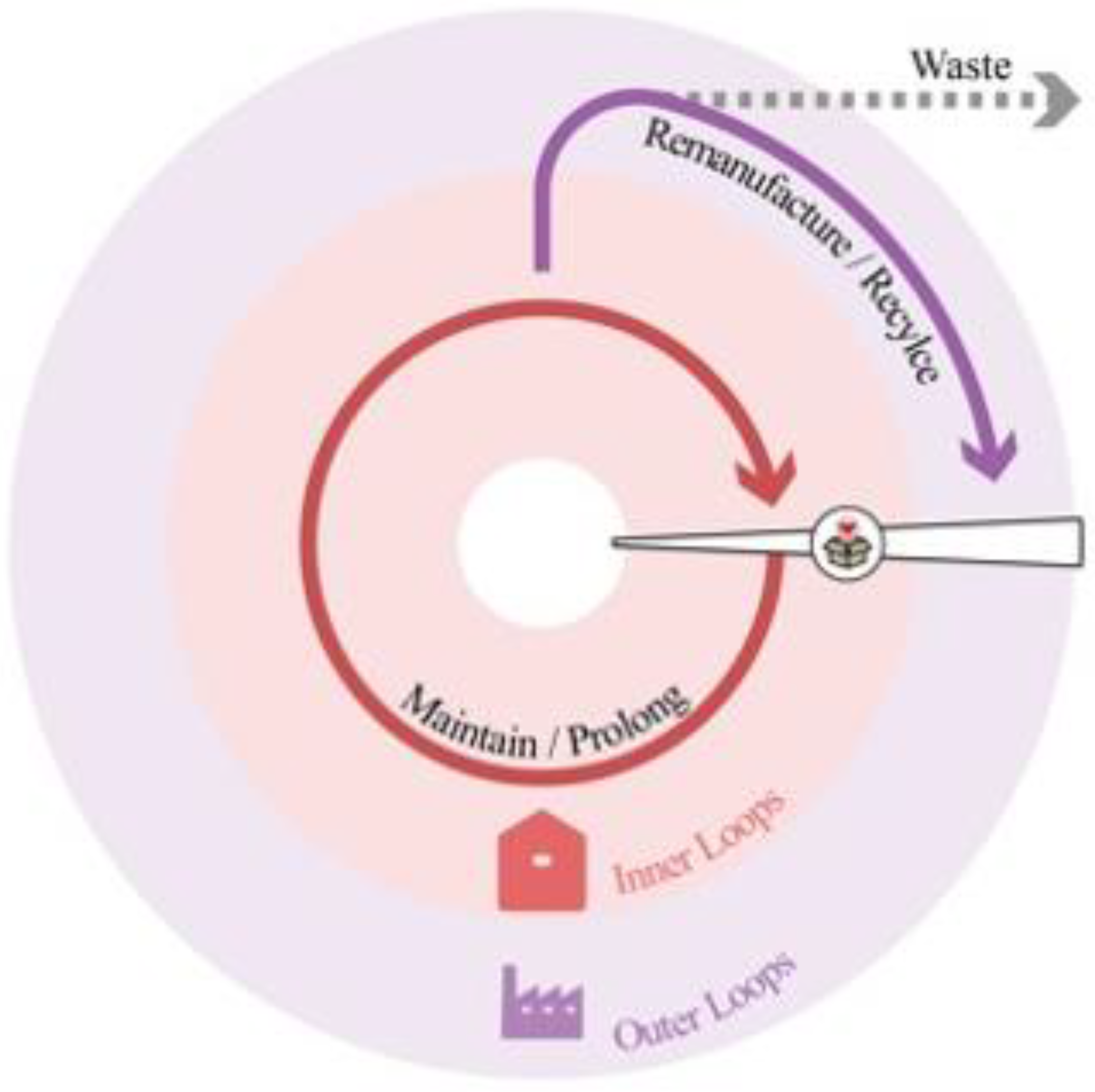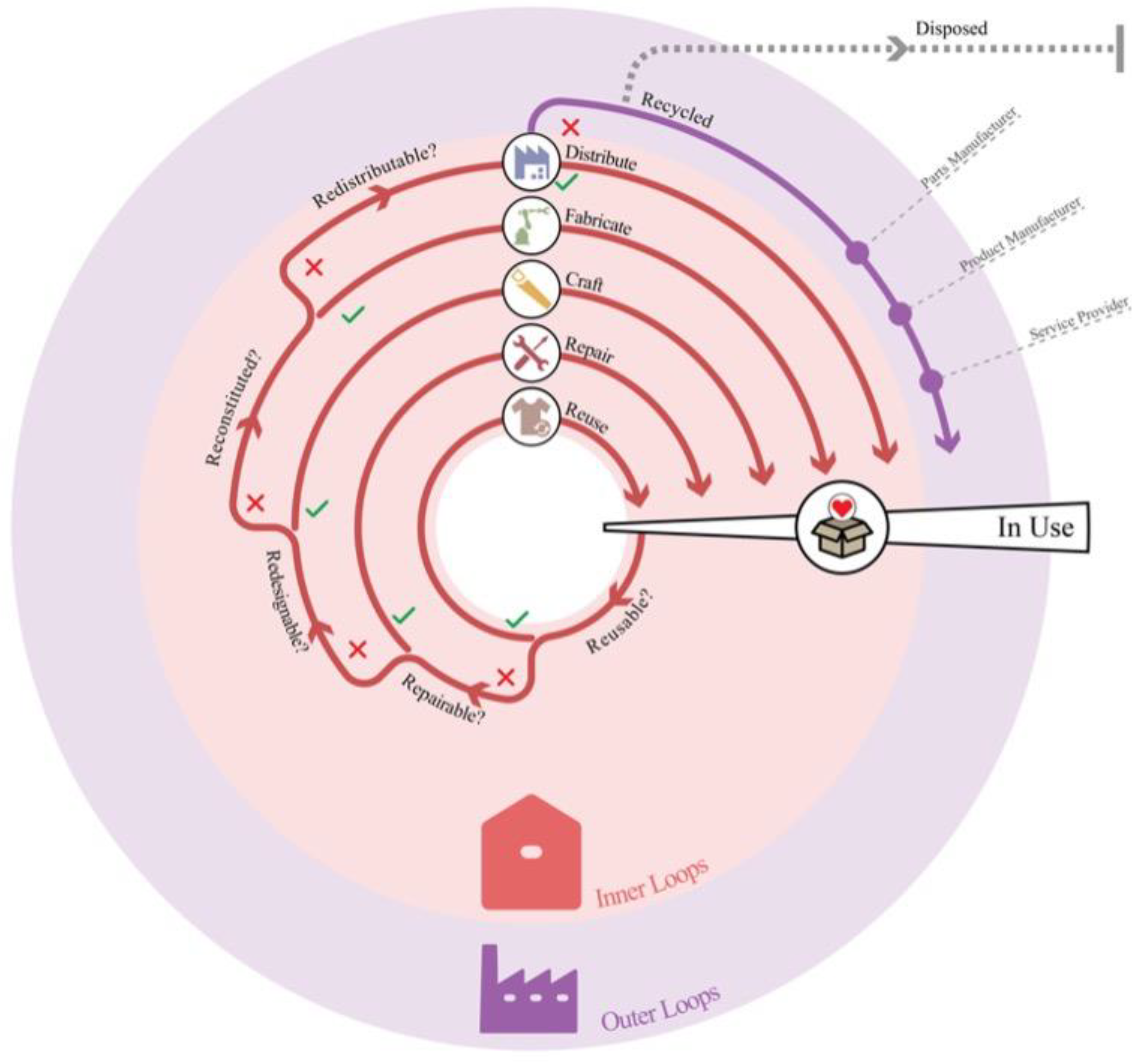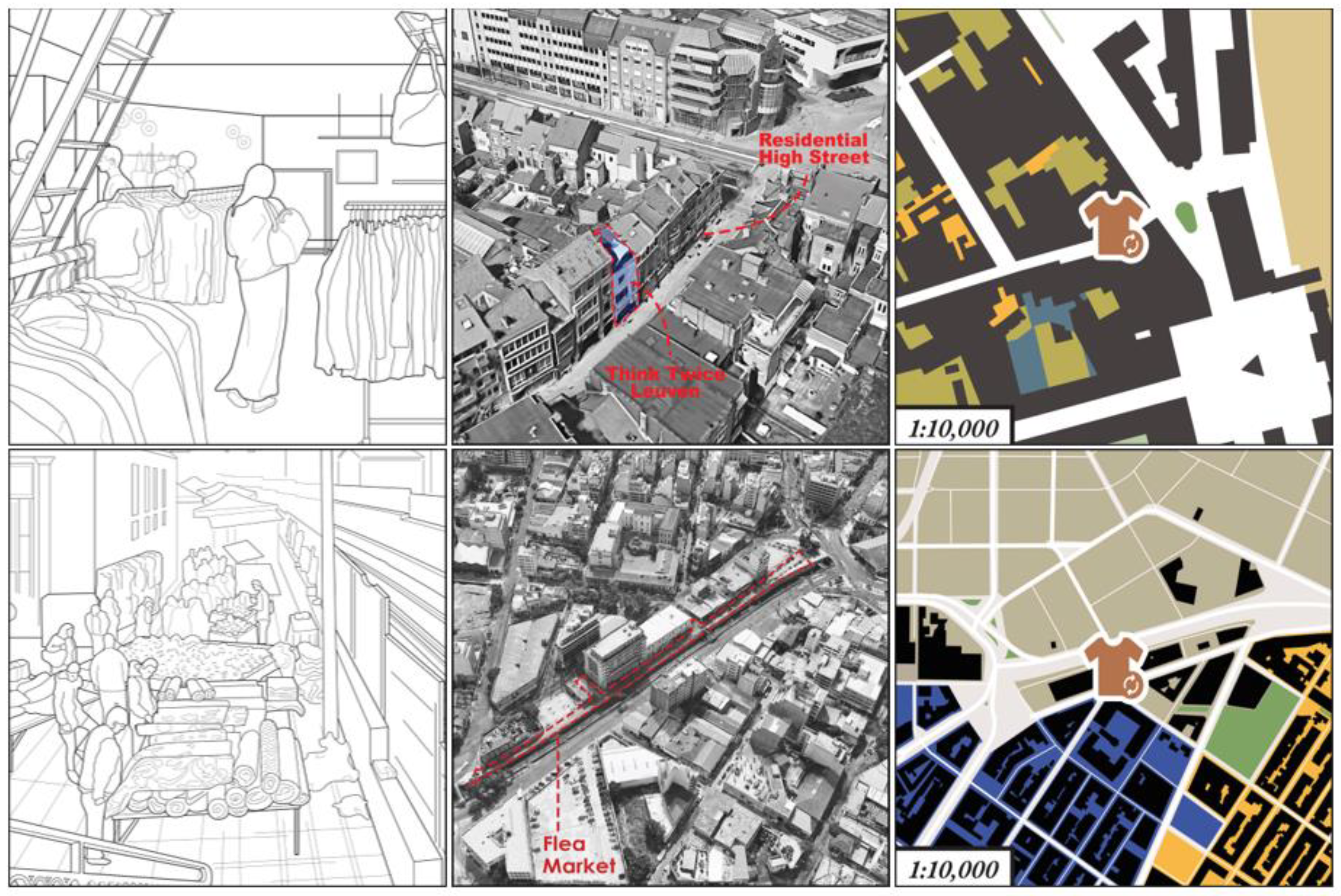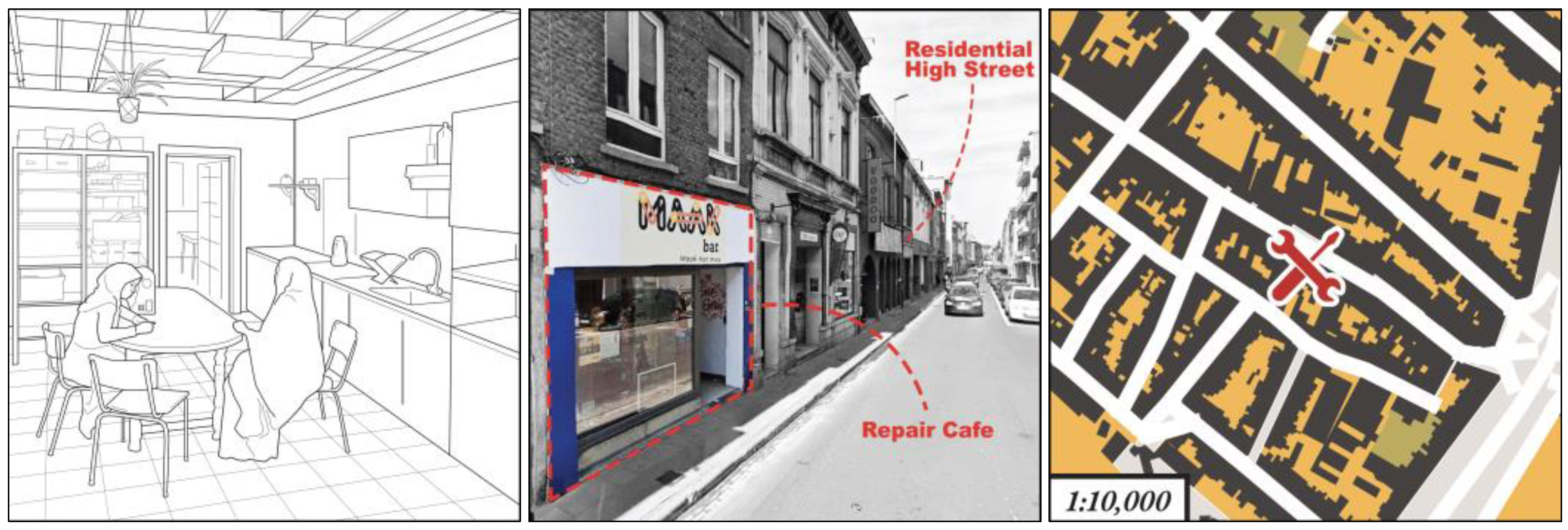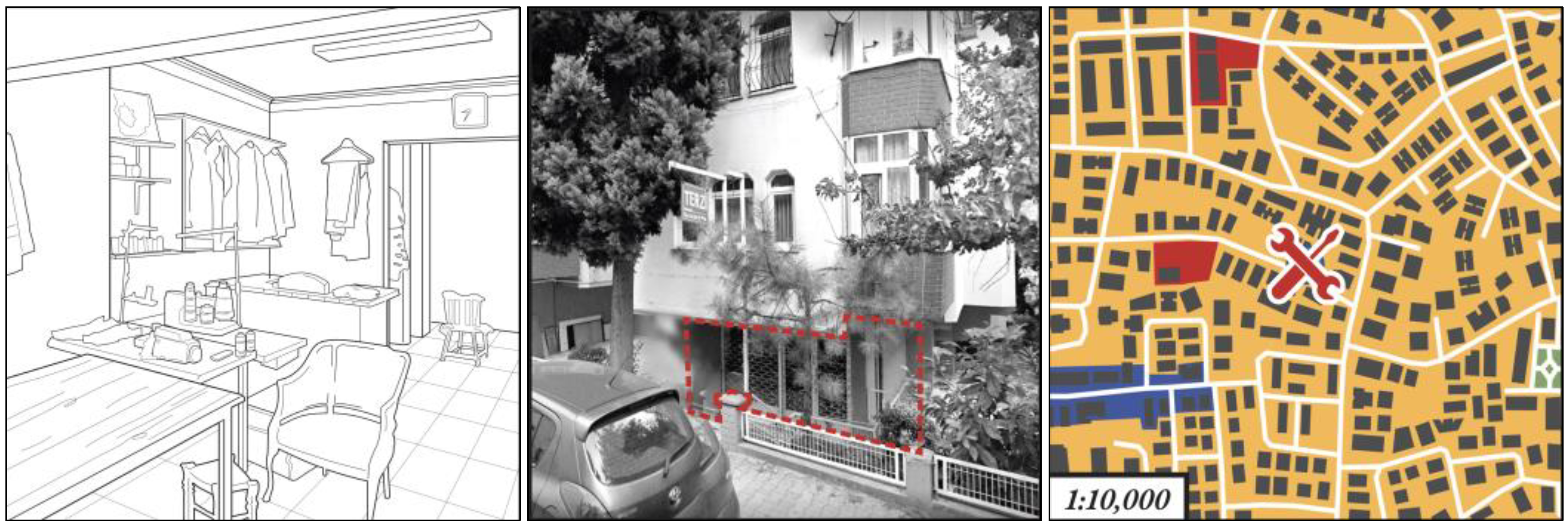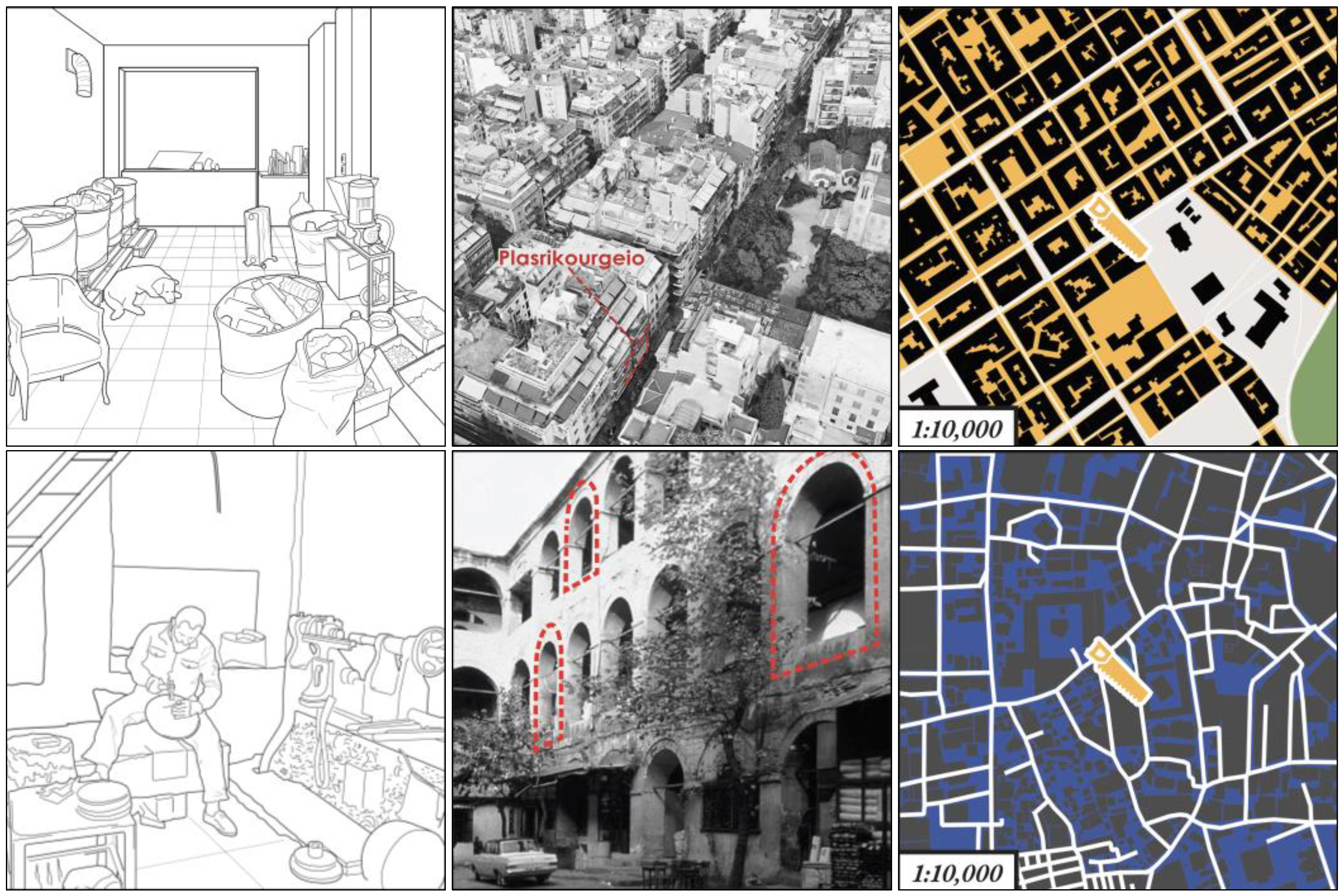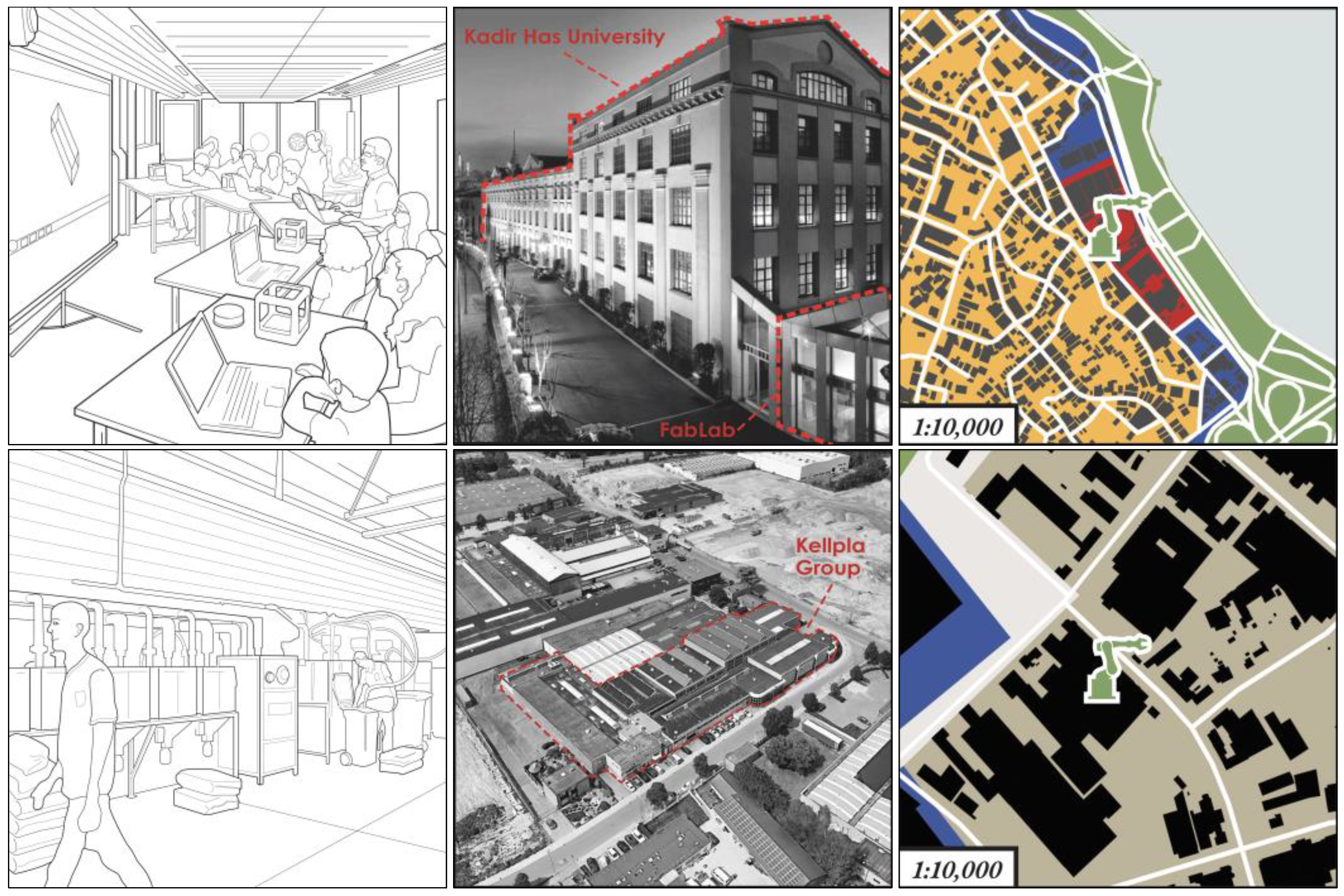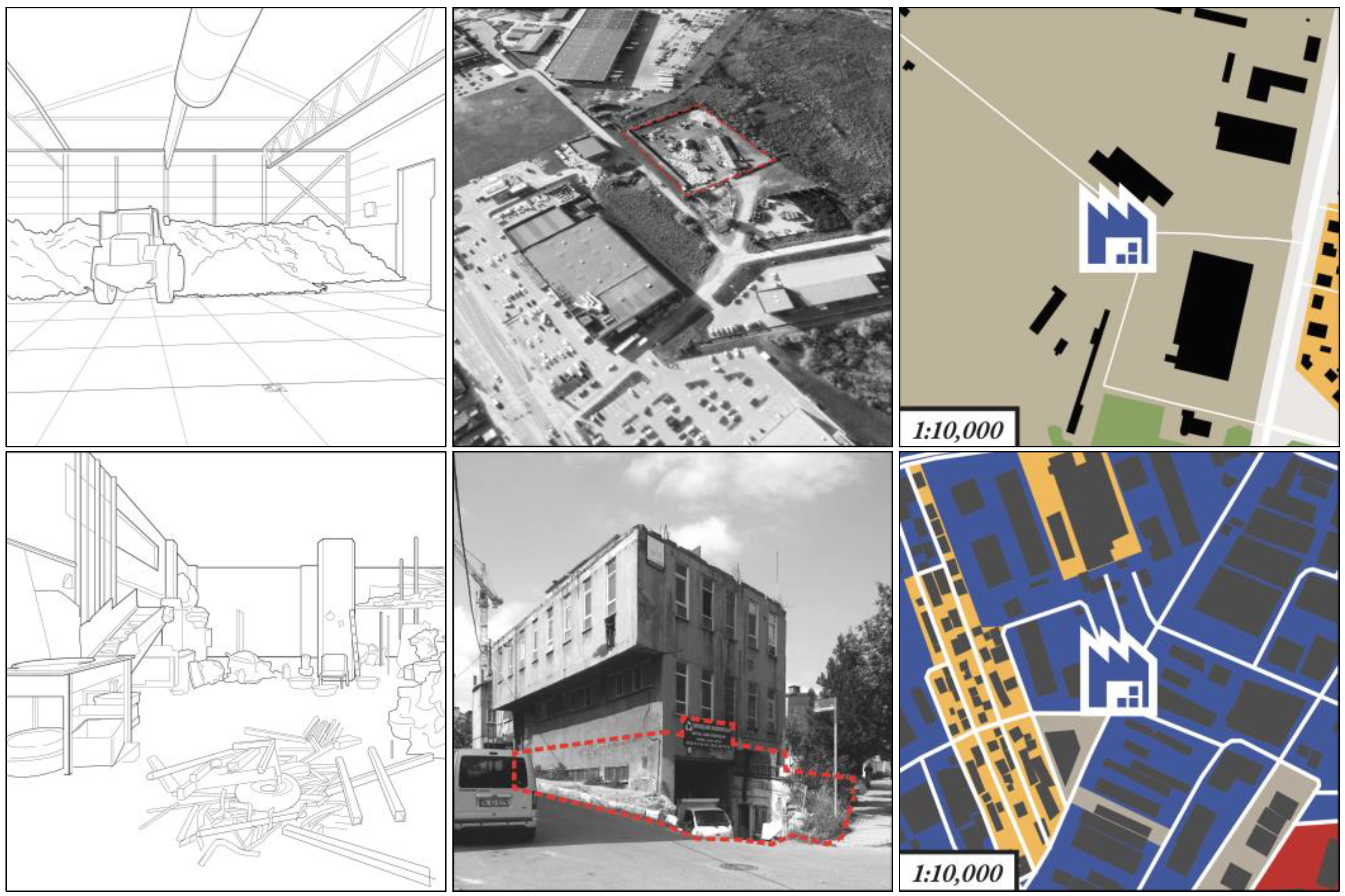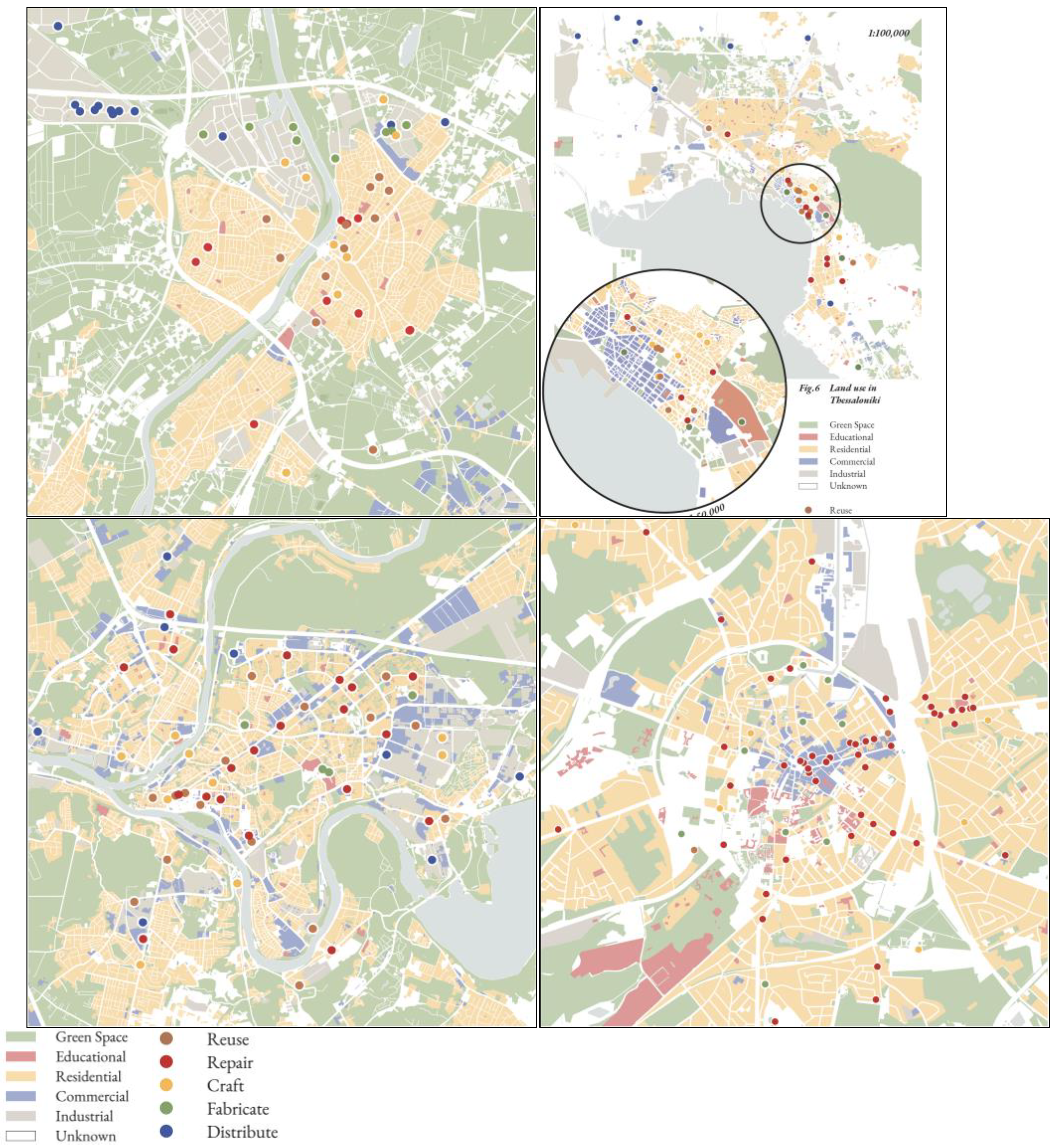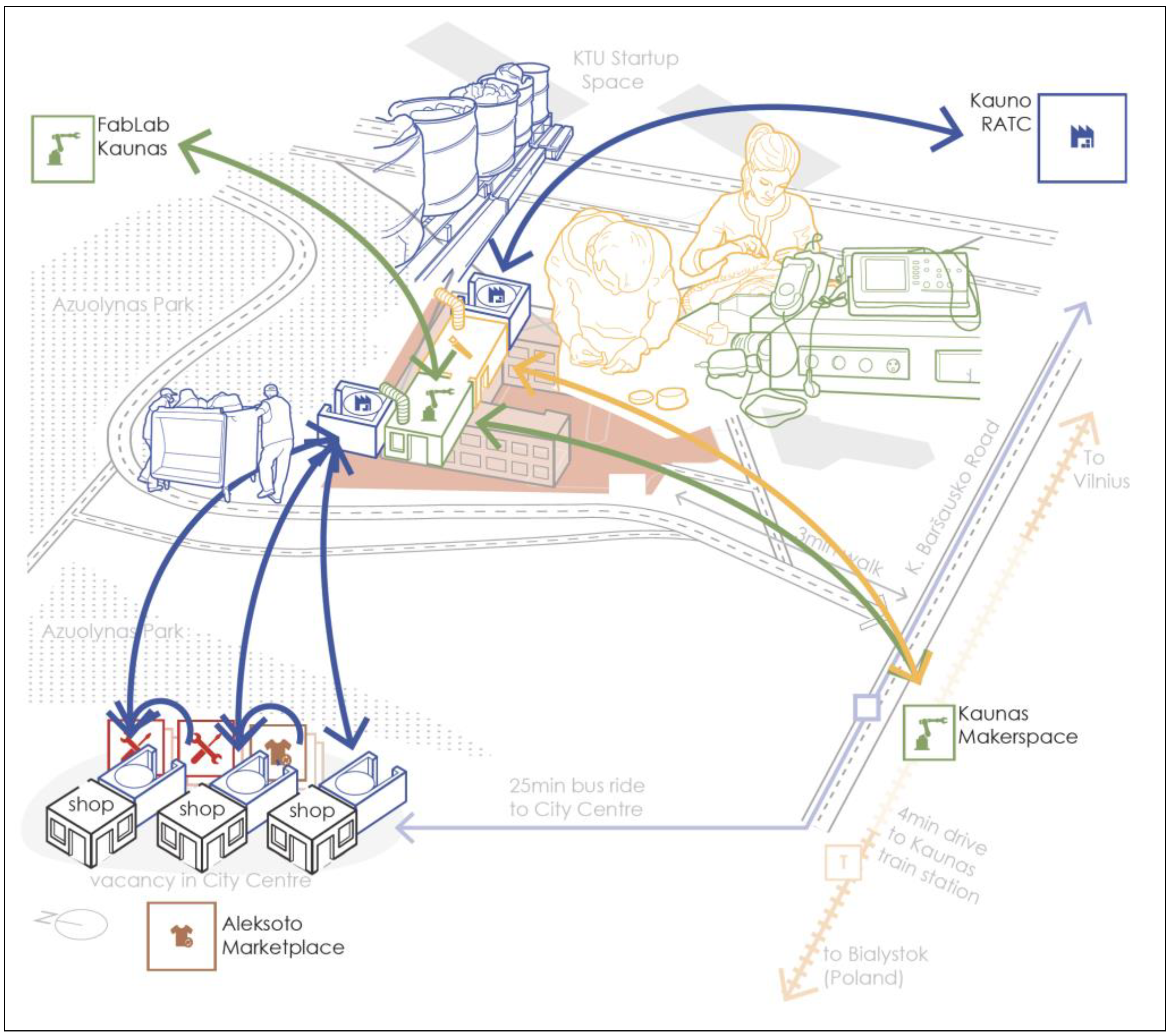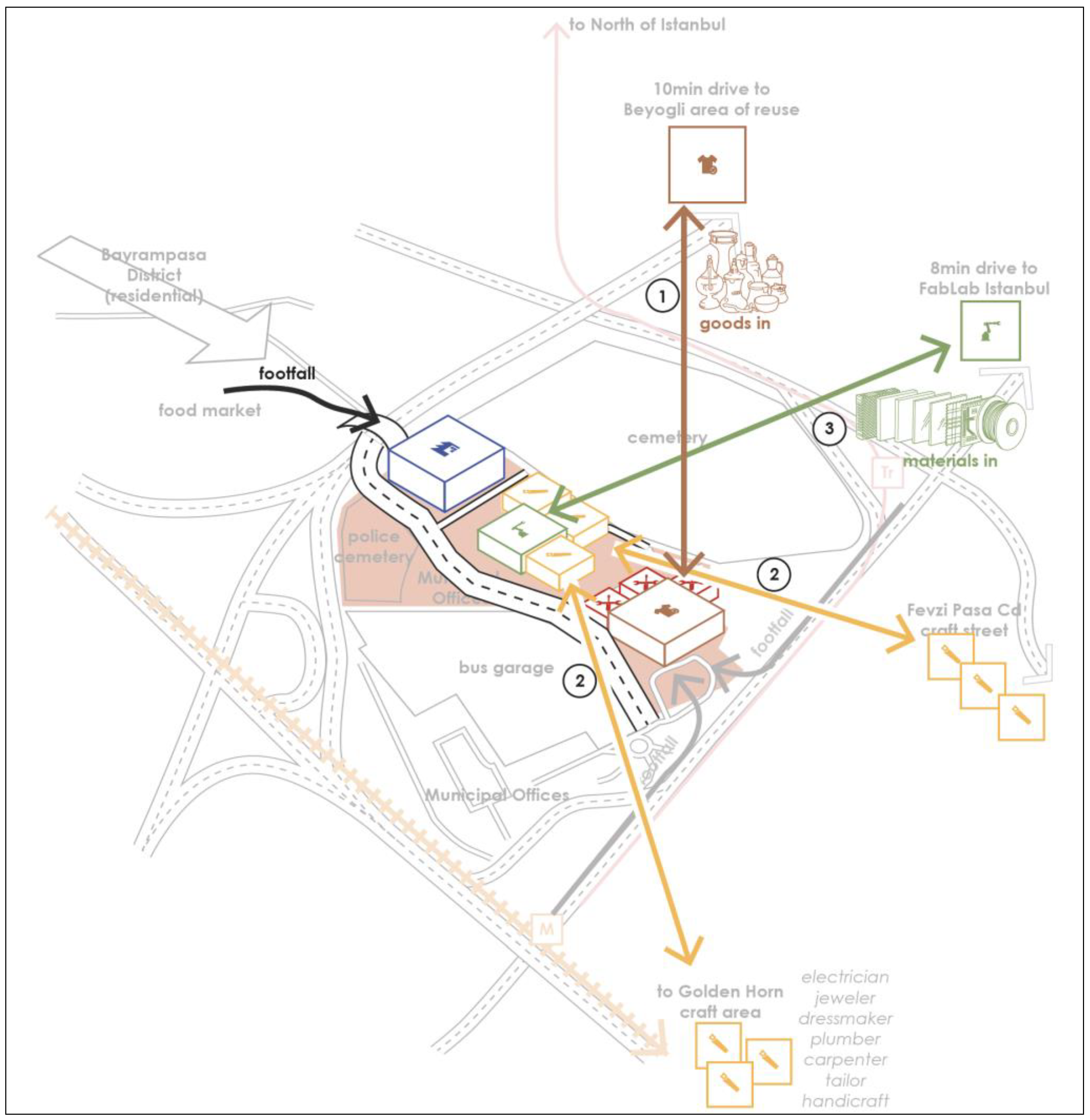1. Introduction
The circular economy (CE) provides the framework to move from the ‘take-make-dispose’ approach of the linear economy based on principles of ‘reduce-reuse-recycle’. The CE approach is particularly important in the face of the urgent climate crisis, the supply of crucial raw materials, and the impacts of waste on health [
1]. An increasing number of theoretical definitions, frameworks and indicators of CE in cities – or ‘circular cities’ - has emerged in the literature [e.g. 2-4]. This reveals that the circular city is a complex and evolving concept, often starting with theoretical and technocratic descriptions of resource flows.
The following definition is of interest here because apart from a focus on resources it also hints at the spatial context: ‘A circular city is based on closing, slowing and narrowing the resource loops as far as possible … with remaining needs for fresh material and energy being covered as far as possible based on local production’ [
2](p.6). Others have subsequently carried an extensive literature review, which in particular identified the additional need for the inclusion of a broader social agenda: ‘[The circular city] also integrates a way … to improve human well-being, reduce emissions, protect and enhance biodiversity, and promote social justice’ [
3](p.7).
The impacts presented by circularity are wide ranging, particularly in cities, where both population density and resource consumption is at its greatest. Williams [
4] comprehensively spells out the potential virtues of adopting circular urban development, combining resource efficiencies with social and economic opportunities:
‘A circular approach to the way in which we manage the resources consumed and produced in cities... will significantly reduce the consumption of finite resources globally. It will also help to address urban problems including resource security, waste disposal, greenhouse gas emissions, pollution, heating, drought and flooding. Taking a circular approach can also tackle many other socio-economic problems afflicting cities, for example, providing access to affordable accommodation, expanding and diversifying the economic base, building more engaged and collaborative communities in cities. Thus, it has great potential to improve our urban living environments.’ [
4](p.2746).
Thus, circular cities have been defined predominantly in techno-centric terms, emphasising resource performance metrics, but are increasingly understood in terms of necessary social and spatial integration [
5]. At a policy level, CE now features in sustainability agendas, notably the first EC circular economy action plan [
6], and the introduction of ‘right to repair’ rules that require manufacturers to build consumer-repairable products [
7]. At the level of individual cities, CE is also prioritised by actions in many global cities [
8] and by local waste management authorities such as the pioneering circular activities of OVAM in the Flanders region [
9], San Francisco’s zero-waste campaigns [
10], and London’s new commitments to zero-waste targets [
11].
At a practical level, CE introduces a new focus on resource cycles such as repairing, reusing, remanufacturing and recycling [
12]. These cycles use collected and redistributed materials, rather than raw materials, and aim to maintain the embedded value of products and materials for the longest period and attempt to eliminate waste wherever possible. The principle of such concentric cycles suggests that the approach operates at a range of spatial scales. The inner loops represent local cycles (maintain, reuse, repair) to conserve products, materials and energy. Outer loops involve larger regional systems which are more susceptible to energy and material leakages resulting from transportation, disassembly and reprocessing (see
Figure 1). According to this model, recycling is the least energy conserving mode, whereas reuse and repair have the most effective circular potential.
Figure 1.
Principles of CE inner and outer material recovery routes. The diagram represents the circulation of value back in to use via inner loops in proximity to the user, reducing reliance on outer loops and leakages to waste disposal.
Figure 1.
Principles of CE inner and outer material recovery routes. The diagram represents the circulation of value back in to use via inner loops in proximity to the user, reducing reliance on outer loops and leakages to waste disposal.
The CE acknowledges the importance of needing to work effectively at all scales – for large and small businesses, for organisations and individuals, globally and locally. However, the applied models of CE focus mainly on the top-down activation of the outer loop activities, targeting manufacturers and often overlooking the role of bottom-up, user orientated, inner loops [
13]. Some authors have suggested that research on circular cities has provided a partial approach with unrealistic, unclear and narrow goals and conclude that:
‘Evidence from practical examples have indeed shown that the greatest challenges ahead lie not in further technological innovation but rather in the role of people, both as individuals and as a society. Future research should explore in greater detail the links between technological and societal challenges to come up with solutions that are well received and correctly utilised by the intended users. Research into the role of policy measures to promote circularity should also be furthered…’ [
13](p.714).
Subsequent literature on circular cities has confirmed the gaps between the idealistic strategies that define the circular economy and the ability for these strategies to affect change in urban development [
14].
This paper examines the tangible urban conditions that exemplify circular activity. Having established that inner loops have the most potential, the focus of this paper is on illustrating the richness and complexity of local circular production – i.e. maker spaces. The literature has recognised that the
making capacity of citizens and consumers in the production cycles will have a significant role to play in reuse and repair routes [15-17]. Others suggest that a radical societal and behavioural shift is required to reach those essential circular functions [
5,
13].
Recent research has shown that urban manufacturing has the potential to contribute environmentally to the circular economy [
18] and that it is the growing maker movement that ‘has been touted as a harbinger of the next industrial revolution’ [
19](p.459). A maker ecology brings with it not only environmental advantages but also social collaboration, knowledge sharing, low-cost innovation and entrepreneurship [
19]. Maker spaces are socially and spatially contextual, draw on local needs and skills, limit transportation of products and consumers, and thus provide models of urban manufacturing that can be replicated and expanded. In summary, the evidence is clear that makerspaces play a vital role in the development of circular cities [
20].
The aim of this research is to reveal the architectural and urban characteristics of the inherent circular capacity shaped by and rooted in social and historical maker spaces that represent models of inner loop circular activities.
2. Materials and Methods
To understand the nature of urban maker ecology, a case study-based approach was used to assess existing maker spaces, supplemented by desk studies and interviews. An analysis of socio-spatial characteristics was based on the examination of 326 maker spaces across seven European cities. The buildings and urban contexts were analysed to define, compare and contrast maker spaces. From this overview, several typologies were identified and for each typology exemplars are presented in more detail in this paper.
This research was undertaken to underpin the building and urban design aspects of the EC ‘Pop-Machina’ H2020 project [
21]. ‘Pop-Machina’ examined the links between the maker movement and circular economy to promote environmental sustainability and generate socio-economic benefits in seven European cities: Leuven (B), Istanbul (TR), Piraeus (GR), Santander (ES), Thessaloniki (GR), Kaunas (LT), and Venlo (NL).
Commencing with a survey of the seven city municipalities, supplemented by interviews and desk research, we identified 326 maker spaces. By collating and cataloguing the characteristics of these maker spaces in relation to circular activities, five generic programmatic typologies emerged that have the potential to stimulate CE inner loop activities.
The five maker space typologies evolve from the generally accepted circular principles of reuse, refurbish, remanufacture and recycle [
22], but here are related to the activities, actors and architecture of maker spaces (discussed and illustrated in detail and through case study examples in the results section below). The five maker space typologies are reuse, repair, craft, fabricate and distribute. They provide the structure for the detailed analysis of the case studies and the related insights. The activities for each typology is introduced below.
3.1. Reuse
Reuse: Spaces that facilitate second-hand trading activities, where people have access to second-hand goods or can drop off their used items for someone else to use. Used furniture, thrift and charity stores are well established examples, often located in publicly accessible, central urban areas. There are no specific tools or skills required by the traders, as the spaces are focused on trade and exchange. Typically, items that have been donated to the store will be sorted, cleaned and repaired, if necessary, but reuse spaces do not facilitate significant repair activities.
3.2. Repair
Spaces that are equipped with facilities, tools and expertise to repair damaged products. Items can be repaired by the customer or by an expert. Repair programmes are approachable, easily accessible, and human-friendly places. They are typically distributed throughout the city, within walking distance from users. Sometimes they are social spaces that accommodate non-specialised participation. They can occasionally provide tools, libraries and online platforms for skills and knowledge exchange, or have the capacity to pass down repair skills and knowledge.
3.3. Craft
Spaces that host traditional forms of production such as woodwork, metalwork, fabrics, jewellery, etc. Craft making is often described as artisanal, handmade or DIY. These crafts workshops provide a tools library and enable specialised skills exchange within the local district. Items produced here can range in size and function and rely on traditional craftsmanship techniques that are passed down generationally.
3.4. Fabricate
Spaces that host making activities that rely on non-traditional digital fabrication techniques, including prototyping and experimental technologies – often referred to as FabLabs. These spaces include specialised tool libraries, machines, and machine-aided design tools. They are sometimes open-source spaces with specialised skills-exchange platforms. These sites are often linked to or part of educational institutions and cater for experts or students. Design or engineering courses will have a dedicated space with FabLab machinery such as CNC machines and laser-cutters.
3.5. Distriubute
Spaces where materials can be stored and redistributed. Usually these are larger waste collection-and-sorting facilities. They often operate at the municipal level or operate alongside local governmental institutions to provide a public service. This infrastructure enables materials of various scales to be collected, sorted, and stored prior to redistribution.
3.6. Overview of typologies
The diagram below (see
Figure 2) depicts these five typologies of maker spaces in relation to the circular economy by matching their programme and urban scale to the main theoretical CE material recovery routes. This diagram is an elaboration of the innermost loop of the CE diagram presented earlier (see
Figure 1). This inner loop reveals the proximity of maker space typologies and circular processes to the user, cascading outwards to minimise reliance on manufacturers and service providers in the outer loop.
Figure 2.
Circular Economy cascading inner loops of material recovery routes. This diagram outlines the possible material recovery routes available within the inner loops. The material recovery routes cascade from most to least effective, correlating with the physical distance to the user.
Figure 2.
Circular Economy cascading inner loops of material recovery routes. This diagram outlines the possible material recovery routes available within the inner loops. The material recovery routes cascade from most to least effective, correlating with the physical distance to the user.
The survey confirmed that these five typologies represent the full range of circular maker spaces that exist across the different cities, exhibiting different features depending on their context. Prior to the definition of the five typologies, these spaces were largely unrecognisable as circular or maker-oriented by city representatives in the ‘Pop-Machina’ project. The typologies thus provided a framework that revealed circular makers and their various manifestations within their urban contexts.
The identification of the 326 maker spaces included an assessment of their urban contexts in each of the seven cities according to the urban analysis. This involved mapping each city’s case study samples in relation to different urban characteristics such as: urban spatial structure (morphology); road transport, public transport, etc. (networks); population characteristics (demographics); historic fabric; knowledge and skills zones. This urban analysis facilitated comparisons of the urban context of maker spaces across cities.
For closer analysis, 35 case studies were selected representing each of the five typologies for each of the seven cities. For these case study maker spaces, more detailed information was gathered for the following factors:
- -
General programme,
- -
People (who works there? who uses the space?),
- -
Materials (what is used? what is produced?)
- -
Machines & tools used,
- -
Interior space description,
- -
Location in the city, and general features of surrounding area,
- -
Urban form of the space.
The purpose of these case studies was to reveal the mechanisms of how, why, and where these typologies thrive, and to demonstrate the capacity for makers, traders, and citizens to be integrated within the wider circular metabolism of cities.
3. Results
The sections below summarise the key characteristics and findings, drawing from the 35 detailed case studies to illustrate each of the maker space typologies.
3.1. Reuse maker space typology
The examination of the Reuse typology has identified the key traits that typically characterise this typology as follows:
Reuse activities mostly occupy spaces associated with second-hand goods such as flea markets or second-hand stores.
They are easily accessible and accrue frequent, high footfall.
They appear mostly around zones of the city where residential and commercial activity meet.
They flourish in more densely populated areas.
Reuse activity coincides with important public transport hubs which helps attract footfall.
For some cities in this study, such as Leuven, Santander, Venlo and Thessaloniki, the Reuse typology case studies are in the form of second-hand chain stores and follow a clear agenda of circular activity and product life extension. These function as reputable, accessible, and easily recognisable bases for people to either buy or drop off second-hand items. They tend to occupy active, noticeable, high-street locations whilst remaining close to local residents. The products are packaged and displayed in a similar manner as fashion goods. The shops use commercial rails, shelves, and display cabinets in the main shopping are of the space, with additional back-of-house storage and support spaces, such as an office or small kitchen.
The multiple locations of these chains increase and diversify their reach. This benefits their sustainable and social mission by engaging diverse communities across the city, region or country. Leuven’s
Think Twice (see
Figure 3) demonstrates this benefit. It is owned by the larger Baltic Textile Trading company which owns and manages several second-hand clothing stores and sorting centres and raises funds for international sustainable development and environmental protection projects. The company has more than 200 chain stores that promote fashionable reuse trends and aims to reduce the demand for ‘fast fashion’. Due to its presence in 12 locations in Belgium alone,
Think Twice has become a trusted brand, known for supporting circular fashion.
This pattern highlights the Reuse typology’s capacity to engage in public awareness of social and sustainability goals. In the Netherlands, Venlo’s Terres des Hommes Kringwinkel operates in a similar manner and is part of a much larger humanitarian organisation focused on preventing the exploitation of children in East Africa, Asia and Europe. Similarly, in Spain, Santander’s Koopera Store is part of a project that focuses on environmental and social awareness and aims to bring attention to principles of the circular economy. Koopera collaborates with local public entities such as social services to offer training to people in marginal social conditions, and currently employs 433 people (of which 243 are from marginalised groups).
The flea markets in Istanbul, Piraeus, and Kaunas represent another Reuse sub-typology. These accommodate reuse in a similar manner but utilise different spatial and urban conditions. They occupy much larger areas with smaller stalls per trader and are often located close to busy public transport stations for easy access and high footfall. The Sunday
Piraeus Flea Market (see
Figure 3) is a good example that demonstrates the popularity and accessibility of this model. Located on the urban boundary with Athens, in the north of Piraeus, the market sprawls adjacent to the crowded M1 overground metro tracks. It has no permanent shelter, no clearly defined boundaries and relies on both formally structured and informal booths.
The Piraeus Flea Market is run and frequented mainly by locals and it trades in a wide variety of used and new items. The flea market’s Reuse model provides opportunities for a variety of traders, some more frequent than others, which could be suitable for cities that flourish under this particular trade culture. It offers an informal, temporary setting that is conducive of alternative trading mechanisms such as bartering, bargaining, and sharing of stalls. These markets play a particularly valuable role within the context of economic constraint, in which people have restricted access to mainstream markets.
These two examples of Reuse typologies (second-hand chain stores and flea markets) demonstrate different spatial characteristics. However, both attract similar users and they function at ‘reuse’ level and thus the innermost loop of the urban circular economy. The range of programmes and spatial characteristics reveal the conditions under which reuse activities can flourish in the city. Although presented as two distinct options within the Reuse typology, it is by no means restricted to one or the other. For example, we can see an overlap between two such spaces in the case of Thessaloniki’s HOB thrift store. Besides operating from their large premises in the centre of Thessaloniki, HOB stores also occasionally travel to flea markets and ‘swap festivals’ occupying designated stalls to sell their goods to a wider audience. This form of hybrid scenario presents a useful precedent, related to urban configuration and circular opportunities, that will be discussed later.
Figure 3.
Illustration and mapping showing the Reuse typology case studies ‘Think Twice’ in Leuven (top row) and the Reuse typology case study Flea Market in Piraeus (bottom row). Each row illustrates the following: 1) spatial character, 2) urban form, and 3) surrounding land use map in relation to case study location (blue: commercial; yellow: residential; green: green space, grey: industrial; red: educational).
Figure 3.
Illustration and mapping showing the Reuse typology case studies ‘Think Twice’ in Leuven (top row) and the Reuse typology case study Flea Market in Piraeus (bottom row). Each row illustrates the following: 1) spatial character, 2) urban form, and 3) surrounding land use map in relation to case study location (blue: commercial; yellow: residential; green: green space, grey: industrial; red: educational).
3.2. Repair maker space typology
The Repair typologies we have identified vary slightly depending on their context but share similar traits and urban characteristics. The main similarities across the seven cities include:
Repair activities mostly occupy small commercial spaces such as shops or cafes, marketed with an identity that reflects the city culture.
They are easily accessible for local people.
They appear mostly in zones of the city where residential and commercial land uses meet.
They flourish in more densely populated areas.
The differences between the examples studied here reveal this typology’s adaptable and evolving nature. For some cities, such as Leuven and Venlo, the Repair typology appears in the form of a designated ‘repair café’ following a clear agenda of circular activity and product life extension. These repair cafés are open for the public to use, functioning as a local café where customers repair their belongings (with access to tools and expertise) while socialising. Repair cafés are widely acknowledged as a type of makerspace, encouraging the democratisation of
making and normalising self-driven repair in society [
23].
The
Maakbar repair café in Leuven (see
Figure 4) represents a clear case study of the ways in which a repair café functions. Here, citizens are invited to repair and circulate their products for life extension themselves by utilising and sharing knowledge, materials and space with other customers. People are encouraged to repair together as a social activity and help others repair their items.
Maakbar also provides a ‘tools-library’ that members can use to repair their items with and then return them for others to use. This space is primarily run by volunteers and targets local hobbyists as well as the general public. Membership costs 30 Euros for an annual subscription.
Maakbar’s recorded activity shows that most items that get repaired are electrical appliances, clothing, small furniture, bicycles, and toys. It occupies a generic commercial space in a very central area, close to main roads and key train stations, making it easily accessible to the majority of Leuven’s population.
Repair cafés build on smaller, bottom-up, local level groups [
23] but benefit from top-down awareness-raising activities of the city. In Venlo and Leuven, the municipality continues to advocate for more sustainable circular policies and incentives, linking these directly to the creative economy and enabling local maker networks to grow. Such top-down policies can positively influence citizens’ relationship to circularity and sustainable lifestyles and in turn, their consumption habits and responsiveness to circular marketing strategies. Repair cafés have therefore emerged as a visible new alternative space where citizens can engage in small scale repair activities of everyday items, whilst also building on the popularity of these spaces due to their association with an everyday social space: the café.
In other cities such as Istanbul, Santander, and Thessaloniki, repair cafés are not so prominent. Instead, the Repair typology appears most commonly in the form of small private businesses such as the traditional local shoemakers, tailors, electronics repair services, or even car repair garages. While this sub-typology is also present in other cities (including Venlo and Leuven), there are observable cultural differences in citizens’ attitudes towards the role of ‘repair’. Repair activities in these contexts are often based in the home, less public and associated with social activities. When they do leave the home, they are conducted by repair specialists who are affordable and have a long-trusted reputation amongst the locals. In these socio-cultural contexts there is less of an explicit emphasis on top-down circular incentives, or an association of ‘repair’ with sustainability. However, a repair culture has long existed in these cities, and it is manifest in a diversity of forms that have evolved over many years.
In Istanbul, we have looked at one of the many
Terzis (tailors) as a Repair typology case study.
Terzi Mustafa (see
Figure 4) is a clothes repair shop in Istanbul, providing services for sewing, alteration and repair. Like most tailors in Istanbul,
Terzi Mustafa specialises in servicing expensive garments - such as jackets, dresses and gowns - extending their life and use which attracts people due to its affordability and resourcefulness.
The shop has a very poor online presence but relies on word-of-mouth via the locals in the neighbourhood to reach target customers. The shop is a fourteen-minute walk from Bakirköy metro station, close to Osmaniye District in the west of the city. While not closely linked to public transport networks, it is within walking distance from its regular customers. The shop is situated on the ground floor of a residential block with visible signage, and a wide glass shopfront that provides a noticeable street presence. This specialism of Terzis is historically and traditionally rooted in the local culture and directly correlates with the inner loop of circular economy activities - product life extension through repair - yet is rarely seriously considered as an official makerspace of circular economic activity.
In Piraeus and Kaunas, a similar model of local private repairers is also prevalent, however, as with some Reuse case studies, these exist as chain stores that are emerging as a sub-type. Takoyni Star shoe repair and locksmith store in Piraeus for example is linked to other branches around Greece and Cyprus. The small branch in Piraeus is a family run business where the master shoemaker is greatly valued by customers. The space it occupies is a small shop with the open plan loosely divided into the ‘maker’ zone and the customer zone. Similarly, we see this sub-typology in the form of electronics repair shops in the commercial centre and residential high-street. For example, Linos Artele in Kaunas is part of a chain of 22 shops in Lithuania often located within large supermarkets.
Figure 4.
Illustration and mapping showing the Repair typology case studies ‘Maakbar’ in Leuven (top row) and ‘Terzi Mustafa’ in Istanbul (bottom row). Each row illustrates the following conditions for every case study: Spatial character, urban form, and surrounding land use map in relation to case study location (blue: commercial; yellow: residential; green: green space, grey: industrial; red: educational).
Figure 4.
Illustration and mapping showing the Repair typology case studies ‘Maakbar’ in Leuven (top row) and ‘Terzi Mustafa’ in Istanbul (bottom row). Each row illustrates the following conditions for every case study: Spatial character, urban form, and surrounding land use map in relation to case study location (blue: commercial; yellow: residential; green: green space, grey: industrial; red: educational).
3.3. Craft maker space typology
The Craft typology is distinguished from Repair and Reuse by its activity associated with making new products. From the samples we have studied we found the following common characteristics of all Craft spaces:
Craft spaces vary in size but typically require more space than Repair and Reuse, depending on the type of materials and items being produced.
The Craft typology tends to flourish in commercial or industrial zones, depending on their type of production.
These spaces typically attract craft specialists or require advanced training.
There is a link between historic fabric and the presence of craft spaces, associated with historically rooted local traditional craftsmanship.
From the seven case studies we have analysed further, the Craft typology inhabits two main distinguishable spaces, a large workshop/studio or a shop/café space, depending on the objects and items being produced. The shop/café sub-typology responds to the type of craft spaces that are less specialised, handle smaller objects, involve less material processing, and target the general public to engage in their activity.
Plastikourgeio in Athens (see
Figure 5) presents a Craft maker space example that aims to engage and train the general public in the use of waste plastics to make new products. This example occupies a prominent shop in a commercial/residential area. The shop’s promotion of sustainability and circular awareness is aided by its easily accessible location and significant presence on the street, increasing its exposure and capacity for accommodating larger groups or attracting passers-by.
Koumpi Coffee & Crafts in Thessaloniki is another example of the Craft shop sub-typology. This is a hybrid social space of a coffee shop and a crafts space for making textiles, jewellery and toys. It offers workshops and skills knowledge sessions. The interior space is divided into two connected rooms, one with a bar and coffee-making equipment where customers can enjoy the café as well as buy items made in the workshop, and the other with a large table and craft supplies. Both rooms are permeated by café customers and have large shop front windows that give good exposure to the main street. Like Plastikourgeio, Koumpi Coffee & Crafts is located in a residential area that is very close to the commercial centre of Thessaloniki old town. This ensures proximity to passers-by and regular customers in the local area.
The other craft sub-typology observed relies on larger, more heavily equipped workshops/studios for more specialised production such as carpentry, metalwork, pottery, and watchmaking. These typically require more space and are dedicated to production activities that attract specialists or students with specific skills and are usually based in more industrial zones of the city. We have identified prominent examples of these in several cities including Leuven, Istanbul, Kaunas and Venlo. Venlo’s Houtvast furniture maker demonstrates the specialist requirements of such spaces. This woodworking company custom-makes furniture and is locally renowned for their skill in using reclaimed wood. Woodworking equipment such as handsaws, bandsaws, planers, drills, and dust extractors are essential for the running of such a workshop. Due to these specific requirements, Houtvast occupies a large warehouse production space in the Veegtes industrial area. Products are either designed in-house, made to order, or customised to client specifications. This maker space is less visible to the general public and more accessible to large vehicles for loading and delivery.
Some cities present a more thriving specialist craft culture than others, often due to historical trading patterns or crafts heritage. Istanbul is a prominent example of this. Our studies of the workshop craft spaces in Istanbul revealed that workshops and traditional making skills are often hosted in the important historical
Hans buildings which have become home to many artists and skilled craftsmen. Most
Hans in Istanbul have been appropriated as a form of collaborative ‘workshop factory’, each with a specific craft specialisation, such as jewellery, metalwork, textiles and silversmithing. The
Buyuk Yeni Han case study (see
Figure 5) demonstrates the collaborative environment of local craftsmen who make unique silver statues, trays, candle sticks, and vases, which are sold on the ground floor shop.
The Hans are typified by a series of cellular, small and adaptable spaces, usually connected by outdoor corridors. These spaces don’t open directly onto main streets but can still be visible to passers-by if they are walking through the courtyard of the Han. Every craftsperson has their own personal workspace, organised according to their preferences and workflow. The collaboration of craftsmen in Buyuk Yeni Han utilises the spatial organisation of this building to perform a complete process of silver working from grain to object.
Silver grain is melted, thinned into sheets, cut and baked in the workshop of Dursun Sahin. Rectangular or circular silver sheets are passed to Eftal Akardere’s workshop for metal spinning, then to Mustafa Karabey for beating, and then Halis Vavci for embossing. Finally, the completed products go into the Sinan Gur polishing workshop before they are displayed for purchase. The cluster of silver working craftsmen in Buyuk Yeni Han is one of the few remaining traditional examples of this Craft typology in the historic centre of the city.
Figure 5.
Illustration and mapping showing the Craft typology case studies ‘Plastikourgeio’ in Athens (top row) and ‘Buyuk Yeni Han’ in Istanbul (bottom row). Each row illustrates the following conditions for every case study starting from left to right: Spatial character, urban form, and surrounding land use map in relation to case study location (blue: commercial; yellow: residential; green: green space, grey: industrial; red: educational).
Figure 5.
Illustration and mapping showing the Craft typology case studies ‘Plastikourgeio’ in Athens (top row) and ‘Buyuk Yeni Han’ in Istanbul (bottom row). Each row illustrates the following conditions for every case study starting from left to right: Spatial character, urban form, and surrounding land use map in relation to case study location (blue: commercial; yellow: residential; green: green space, grey: industrial; red: educational).
3.4. Fabricate maker space typology
The Fabricate typology, or fab lab (fabrication laboratory), is primarily considered as part of the production rather than maintenance cycle of reuse and repair. Here new products can be made in close proximity to the user/maker, using high-tech digital tools and machinery, and drawing on locally sourced, inexpensive waste feedstocks of inert and biomaterials [
24]. From our analyses of Fabricate examples across the seven cities, we have found that the main characteristics include the following:
They are closely linked to educational/university facilities in most cities.
They are identified as and referred to as fab labs, where prototyping and experimental making activities take place.
They require specialist skills, machines and tools for small scale digital manufacturing such as 3D printers, laser cutters and precision mills in combination with 3D modelling software and computer aided design (CAD).
Most of the Fabricate case studies across the seven cities were connected to the FabLab Network online. This is a network of 1,500 fab labs, located in more than 90 countries, supporting creative communities of fabricators, artists, scientists, engineers, educators, and students ‘inventing the next generation of manufacturing and personal fabrication’ [
25]. Digital fabrication is considered by some to be the cornerstone of the emerging fourth industrial revolution [
26]. It represents local circular economies and provides an opportunity to bridge the sustainability gap to larger and more centralised manufacturing industries [
24].
A typical example is
FabLab Istanbul (see
Figure 6) which operates from the Cibali Campus of the Kadir Has University, and is open to the public. This fab lab focuses on educational facilitation, organising workshops, digital skills sharing, and events networked with other local stakeholders such as
Living Lab Basaksehir, Salt Galata Museum, Istanbul Maker Lab (Maker Atolye) and
ImeceLAB. Although the educational setting promotes use by students, the FabLab is open to anyone who would like to use it, subject to a reservation or booking. In other cities, a fab lab’s strong dependence and link to university education creates an even more specialised setting for students to use. In Kaunas, the fab lab operates in the Kaunas University of Technology campus and is heavily supported by electronics manufacturing company Kitron. This has influenced the fab lab’s focus on electronics manufacturing themes including Avionics and Nanosatellites.
Almost all the Fabricate case studies we have analysed were fab labs with an experimental, educational, and small-scale manufacturing agenda. The only exception was Venlo’s
Kellpla Group (see
Figure 6) which is an active manufacturer of plastic injection moulding, offering highly flexible and customisable production due to their use of digitised manufacturing robotics that can easily be programmed to adjust to the client’s diverse needs.
Kellpla collaborates with schools to organise tours, presentations, and workshops with school children to expose young generations to digital manufacturing. It occupies a large warehouse space and operates in the form of a digital factory in the industrial zone in Venlo.
Figure 6.
Illustration and mapping showing the Fabricate typology case studies ‘Istanbul Fab Lab’ (top row) and ‘Kellpla Group’ in Venlo (bottom row). Each row illustrates the following conditions for every case study starting from left to right: Spatial character, urban form, and surrounding land use map in relation to case study location (blue: commercial; yellow: residential; green: green space, grey: industrial; red: educational)
Figure 6.
Illustration and mapping showing the Fabricate typology case studies ‘Istanbul Fab Lab’ (top row) and ‘Kellpla Group’ in Venlo (bottom row). Each row illustrates the following conditions for every case study starting from left to right: Spatial character, urban form, and surrounding land use map in relation to case study location (blue: commercial; yellow: residential; green: green space, grey: industrial; red: educational)
3.5. Distribute maker space typology
The Distribute typology is different to the other four typologies in that it focuses on the spaces and programmes that facilitate material recycling (collection, sorting, storage, and distribution). It strengthens the circular capacity of the other four typologies where materials are processed. The Distribute case studies we have analysed typically include waste sorting sites and recycling centres. There is usually a main large site with networks of smaller waste collection sites around the city. Our results have identified the key traits that characterise the Distribute typology as follows:
Distribute activities are multi-nodal and operate within a larger network of spaces, vehicles and roads.
The main material sorting and redistribution sites are found in industrial zones, relying on large vehicle access rather than public access.
Distribute activities are managed at an urban and regional scale, usually under a waste management entity.
Even though this typology does not present a significant manufacturing or making capacity, it is essential in connecting the other typologies to material resources that would otherwise go to waste. The other typologies become circular if their materials (input and output) are sourced and distributed as part of a larger circular material flow system. Therefore, we have identified the programmes and spaces with a distribution capacity as a specific typology, acting as material collector and supplier.
The Distribute typology is exemplified by recycling centres or parks, where waste is collected, sorted, graded, prepared and sometimes processed or compressed before being redistributed. These sites can host larger scale items such as vehicles, scrap metal, furniture, tires, household appliances, and construction waste. The various Distribute programmes are often split into different facilities run by the same company or municipal waste management network. For example, the
Kaunas RATC (see
Figure 8) is a waste management initiative funded by the EU and the
UAB Kauno Svara private waste company. It aims to reduce the amount of landfill by redistributing salvageable waste.
There are various sites associated with RATC that handle different stages of the redistribution process. Our study focused on the Julijanavos Street collection site as it exhibited strong capacity for waste collection and acted as a channel to relevant material sorting sites. Julijanavos Street has no capacity for sorting or processing of materials but is devoted to collection and redistribution. It only accepts waste brought in by the general population and by its own municipal waste collection network, and generally does not accept industrial or business waste on its site. Customers are obligated to correctly sort the waste into designated containers under the supervision of Kaunas RATC employees. The collected waste is then taken to other sorting plants from which it is recycled or placed in the ‘Exchange and Resurrection Scheme’ where salvageable items are made available to people for free.
Other case studies exhibit specific material specialisation such as
Çavuşlar Hurdacılık scrap metal distributor in Istanbul (see
Figure 7). This is a semi-formal Distribute model that operates from a junkyard on a lower ground floor of a vacant building. Unlike other Distribute case studies,
Çavuşlar Hurdacılık is based in a commercial rather than industrial area and is able to make good use of local waste streams. This site collects scrap metal from the local area, sorting it and redistributing it for new uses.
Figure 7.
Illustration and mapping showing the Distribute typology case studies ‘Kaunas RATC’ (top row) and ‘Çavuşlar Hurdacılık’ in Istanbul (bottom row). Each row illustrates the following conditions for every case study starting from left to right: Spatial character, urban form, and surrounding land use map in relation to case study location (blue: commercial; yellow: residential; green: green space, grey: industrial; red: educational)
Figure 7.
Illustration and mapping showing the Distribute typology case studies ‘Kaunas RATC’ (top row) and ‘Çavuşlar Hurdacılık’ in Istanbul (bottom row). Each row illustrates the following conditions for every case study starting from left to right: Spatial character, urban form, and surrounding land use map in relation to case study location (blue: commercial; yellow: residential; green: green space, grey: industrial; red: educational)
4. Discussion
4.1. Diversity and commonality
The definition of the five maker space typologies enables the identification of the spatial and urban contexts of circular programmes, and the relationship to the inner loops of CE. This insight can inform an understanding of how such diverse everyday spaces are part of a circular urban metabolism. This study examined the urban conditions that facilitate circular activity and identified spaces as circular exemplars, often hidden in plane sight. Revealing and describing such everyday maker spaces, their context and their activities, is a key step in informing circular strategies in the city, providing context-specific exemplars for more diverse and effective circular city development.
The findings have revealed some common urban characteristics between Craft, Reuse, and Repair spaces in particular – those associated most closely with the inner loop of circular making. These spaces cluster in the city and rely on similar land use characteristics - mostly a mix of commercial and residential areas with high footfall and pedestrian access (see
Figure 8). This recurrent pattern across different cities suggests that the social and spatial conditions required for these activities to thrive depend on similar location, facilities and types of spaces.
Figure 8.
Maps showing clusters of Reuse, Repair and Craft typologies across four cities: Venlo, Thessaloniki, Kaunas, Leuven (from top left to bottom right). Maps include surrounding land use information (blue: commercial; yellow: residential; green: green space, grey: industrial; red: educational)
Figure 8.
Maps showing clusters of Reuse, Repair and Craft typologies across four cities: Venlo, Thessaloniki, Kaunas, Leuven (from top left to bottom right). Maps include surrounding land use information (blue: commercial; yellow: residential; green: green space, grey: industrial; red: educational)
4.2. Hybridity
In Thessaloniki, the Repair and Craft case studies have similarities and in some cases they combine the two activities to for a hybrid typology. For example, the neighbourhood seamstress identified as a Repair typology is a small business run by Georgia in the east of Thessaloniki. Her business focuses on garment repair and alterations, but also custom-made original clothing made from scratch. Koumpi Coffee & Crafts on the other hand has been identified as a Craft typology which operates as a regular coffee shop while using a part of the space where customers and makers frequently mix. These two examples are very similar in terms of their circular functions. The seamstress may indeed craft new products within the scope of her facilities, whilst the Koumpi Coffee & Crafts facilities can be used to repair items. Both operate within a typical retail or shop space.
In other cities the division between Repair and Craft is clearer, often dictated by the scale of the materials being processed, repaired, or crafted. For example, Istanbul’s craft case study, Buyuk Yeni Han workshop, is a highly specialised type of making. The Craft typology here becomes more distinguishable, though it still holds potential for repair activities.
It is thus helpful to consider potential overlaps between typologies and circular functions according to the type of space that they occupy. Reuse and Repair share the ’maintain and prolong’ phase of CE. Out of the cases studied, we found that 79% occupy conventional retail space (shops, cafés, stores) while 21% occupy open markets. Craft and Fabricate examples share the ’make and remanufacture’ function of CE and 43% occupy digital lab spaces, 29% manual workshop space, 21% conventional retail space, and 7% industrial sites. Distribute types can potentially circulate materials across all the typologies and in our sample we found that 86% of them occupy large scale industrial or waste management sites, while 14% occupy urban garages.
From these insights, it becomes clear that for the ’maintain and prolong’ phase, conventional retail spaces play an important role in hosting Reuse and Repair activities. Meanwhile, for the community-based making and remanufacture phase of CE, a combination of digital labs, manual workshops, and conventional retail space is crucial. For the materials distribution, collection and storage, larger scale industrial and waste management sites play a significant role in connecting channels of material flows to other typologies.
This study also detected relational and networking capacities that enable circular makers to thrive. Such symbiotic relationships reveal that these typologies do not exist in isolation; they flourish within a network of various partners and diverse programmes. An example of such partnerships forming amongst the typologies can be seen in Leuven: The Ecowerf case study which was identified as a Distribute typology works closely with the Maakbar Repair typology. In this productive partnership, Ecowerf acts as a form of materials bank for Maakbar where products are repaired, requiring constant streams of e-waste, fabrics, etc. Maakbar acts both as an outlet for repaired goods but also as a resource base for waste materials which then flow back to Ecowerf where it is sorted and recirculated or recycled.
4.3. Design implications
The above insights related to typologies, context and symbiosis have circular planning implications. There is a potential opportunity to leverage the knowledge gained of maker spaces to bridge the ‘sustainability gap’ between local and regional scale manufacturing [
24](p.27). A ‘design-research’ mode of enquiry was employed to identify unique and practical lessons building on the results and findings [
27]. A series of design studies were carried out that combine circular maker space programmes for locations in each of the seven cities. It provided an opportunity to examine and visualise hybrid formations of the five typologies within the context of each city.
Different hybrid maker spaces were proposed responding to specific city needs and assets. For example, in Kaunas, the proposal examined a design strategy that bridged the gap between the high-tech industry developing through KTU and the prevalent low-tech Repair and Reuse industries in the city (see
Figure 9). A hybrid model of the Craft and Fabricate typologies places technology in proximity to traditional craft making, encouraging cross-pollination, and initiating the development of a making network across the city. This hybrid incorporated satellite sites in vacant buildings that could act as Distribute typologies by creating new channels of material flows around the city.
Figure 9.
Axonometric drawing of Kaunas city proposal incorporating typology hybridity principle.
Figure 9.
Axonometric drawing of Kaunas city proposal incorporating typology hybridity principle.
In Istanbul, the hybrid proposal was designed to demonstrate a strategy for sharing spaces as well as resources to enhance each typology’s operations (see Figure 11). The thriving Reuse typology was adopted as a link to the local Beyogli Reuse area. A Fabricate centre was envisaged as a means to manage the waste-to-material technology in collaboration with other Fabricate typologies in the city. Meanwhile the site was structured as a base for craftsmen to share tools, space, skills and resources with aspiring repair specialists in domains such as carpentry, electronics, shoes, and bicycle repairs.
Figure 10.
Axonometric drawing of Istanbul city proposal incorporating typology hybridity principle.
Figure 10.
Axonometric drawing of Istanbul city proposal incorporating typology hybridity principle.
Such proposals have prompted wider application and exploitation of relational possibilities of the five typologies and how they can interact in various combinations, depending on their spatial and urban context. The identification of such relationships reveal ways to increase the critical mass and diversity of makers spaces in the city, and strengthening circular city planning strategies. The hybridity and relationality of maker spaces provide a model vision for redistributed manufacturing (RDM) and ‘Industry 4.0’ [29].
5. Conclusions
The five circular maker typologies and their spatial character, identified and defined in this study, embody the design nature of an urban circular metabolism in their physical and social contexts.
This study examined existing urban programmes centred on makers in relation to the inner loops in CE theory. The case study examples reveal the design characteristics of the circular economy in everyday urban life. Working at an urban, building and human scale has identified urban mechanisms that can make circular production cycles tangible, accessible and familiar to potential users.
Spatial and contextual urban factors define the location and characteristics of the five typologies. Neighbourhood characteristics, size and access to transport all contribute to the traditional persistence of these local spaces. The studies show that these typologies hold the capacity to not only continue to thrive but to work symbiotically and as part of a larger circular production ecosystem. These connections are tested further in the ‘Pop-Machina’ project at the level of new and individual maker spaces in order to improve their circular performance. The ways maker spaces hybridise – by combining different typologies - increases the range and possibilities of circularity and builds on the social and physical networks that sustain makers.
An understanding of makers and the spaces they occupy, beyond a predominant focus on fab labs, has enabled a more complete recognition of sustainable and circular urban production. A wider definition of this type of urban activity makes these everyday maker spaces available for integration into an understanding of urban metabolism and acknowledges their social and material value. For instance, the ‘repair café’ sub-typology exists in different forms and has a differing status depending on its context. Two out of seven cities we have studied revealed a prominent repair café culture, but it is clear that Repair spaces are evident in the other cities. Furthermore, such communities of skilled repair expertise are understood as distinct from the digital fabrication and material reuse experts that are based in fab labs.
Our typological study of circular maker spaces has revealed a diversity of examples evident across all seven cities and their potential for productive interdependence. This spatial and typological diversity of circular maker capacity is especially important to consider as we shift towards adopting circular city models and policies. The tendency to emphasise one particular form of making can be limiting if not attuned to local socio-spatial dynamics and opportunities. It prompts an engagement with the existing local circular maker dynamics that can help shape the path towards a circular urban metabolism more suited to a city’s culture and place.
Author Contributions
Conceptualization, I.S. and K.S.; methodology, R.E, I.S and K.S.; formal analysis, R.E.; investigation, R.E.; writing—original draft preparation, R.E.; writing—review and editing, I.S and K.S.; visualization, R.E..; supervision, I.S. and K.S.; project administration, K.S.; funding acquisition, K.S. All authors have read and agreed to the published version of the manuscript.
Funding
This research was carried out as part of the Pop-Machina project which received funding from the European Union’s Horizon 2020 Research and Innovation Programme under grant agreement No. 821479.
Acknowledgments
The authors acknowledge the valuable contributions made by the Pop-Machina research team at the University of Cambridge Department of Architecture: Nicole Michaletos, Ioana Gherghel, Joseph Marchbank, Dustin May, Jennifer Smith and Hadley Clarke. They undertook initial urban analysis and graphics used in this paper. Hadley Clarke produced graphics for Fig. 1 and 2. We are grateful for the time and insights given by all the city representatives and experts consulted during this work.
Conflicts of Interest
The authors declare no conflict of interest. The funders had no role in the design of the study; in the collection, analyses, or interpretation of data; in the writing of the manuscript; or in the decision to publish the results.
References
- United Nations, Turning waste into wealth: World Habitat Day focus on cleaning up cities. UN News, 9 October 2019. Available online: https://news.un.org/en/story/2019/10/1048692 (Accessed: 27 05 2023).
- Paiho, S.; Mäki, E.; Wessberg, N.; Paavola, M.; Tuominen, P.; Antikainen, M.; Heikkilä, J.; Rozado, C.A.; Jung, N. Towards circular cities—Conceptualizing core aspects. Sustain. Cities Soc. 2020, 59, 102143. [CrossRef]
- Bîrgovan, A.L.; Lakatos, E.S.; Szilagyi, A.; Cioca, L.I.; Pacurariu, R.L.; Ciobanu, G.; Rada, E.C. How Should We Measure? A Review of Circular Cities Indicators. Int. J. Environ. Res. Public Health 2022, 19, 5177. [CrossRef]
- Williams, J. Circular cities. Urban Studies 2019, 56(13), 2746-2762.
- Marin, J.; De Meulder, B. Interpreting Circularity: Circular City Representations Concealing Transition Drivers. Sustainability 2018, 10, 1310. [CrossRef]
- European Commission. A new Circular Economy Action Plan for a cleaner and more competitive Europe, EC, COM/2020/98, 2020. Available online: https://eur-lex.europa.eu/legal-content/EN/TXT/?qid=1583933814386&uri=COM:2020:98:FIN (Accessed 17 06 2023).
- European Commission. Proposal for a Directive on common rules promoting the repair of goods, EC, 2023. Available online: https://eur-lex.europa.eu/legal-content/EN/TXT/?uri=CELEX%3A52023PC0155 (Accessed 13 Sept 2023).
- C40 Cities. Advancing Towards Zero Waste Declaration, C40 Cities Climate Leadership Group, 2018. Available online: https://www.c40.org/wp-content/static/other_uploads/images/1851_Zero_Waste_declaration_FINAL_5July.original.pdf?1530818554%22 (Accessed 15 September 2023).
- Condamine, P. Flanders’ implementation plan for household waste and comparable industrial waste 2016-2022, Zero Waste Europe, 18 Nov 2020. Available online: https://zerowasteeurope.eu/library/flanders-implementation-plan-for-household-waste/ (Accessed online: 12 10 2023).
- Environmental Protection Agency, Zero Waste Case Study: San Francisco, EPA (USA) 2023. Available online: https://www.epa.gov/transforming-waste-tool/zero-waste-case-study-san-francisco (Accessed 15 Sept 2023).
- Greater London Authority, Waste policy, GLA (UK) 2023. Available online: https://www.london.gov.uk/programmes-and-strategies/environment-and-climate-change/waste-and-recycling/waste-policy (Accessed 15 Sept 2023).
- Ellen MacArthur Foundation (2022), The technical cycle of the butterfly diagram 2022. Available online: https://ellenmacarthurfoundation.org/articles/the-technical-cycle-of-the-butterfly-diagram (Accessed 14 Sept 2023).
- Pomponi, F.; Moncaster, A. Circular economy for the built environment: A research framework. Journal of Cleaner Production 2016, 143, 710–718. [CrossRef]
- Prendeville, S.; Cherim, E.; Bocken, N. Circular Cities: Mapping Six Cities in Transition. Environmental Innovation and Societal Transitions 2018, 26, 171–194. [CrossRef]
- Charter, M.; Keiller, S. (2014). Grassroots Innovation and the Circular Economy: A glocal survey of repair cafés and hackerspaces 2014. The Centre for Sustainable Design, University of the Creative Arts, Surrey, UK, 1-18. Available online: https://cfsd.org.uk/site-pdfs/circular-economy-and-grassroots-innovation/Survey-of-Repair-Cafes-and-Hackerspaces.pdf (Accessed 12 Oct 2023).
- Kohtala, C.; Hyysalo, S. Anticipated environmental sustainability of personal fabrication. Journal of Cleaner Production 2015, 99, 333-344. [CrossRef]
- Ordóñez, I.; Rexfelt, O.; Hagy, S.; Unkrig, L. Designing Away Waste: A Comparative Analysis of Urban Reuse and Remanufacture Initiatives. Recycling 2019, 4, 15. [CrossRef]
- Tsui, T.; Peck, D.; Geldermans, B.; van Timmeren, A. The Role of Urban Manufacturing for a Circular Economy in Cities. Sustainability 2021, 13, 23. [CrossRef]
- Browder, R.E.; Aldrich, H.E.; Bradley, S.W. The emergence of the maker movement: Implications for entrepreneurship research, Journal of Business Venturing 2019, 34(3), 459-476. [CrossRef]
- Prendeville, S.; Hartung, G.; Brass, C.; Purvis, E.; Hall, A. Circular Makerspaces: the founder’s view, International Journal of Sustainable Engineering 2017, 10(4-5), 272-288. [CrossRef]
- Pop-Machina, Project website, EC Horizon 2020 Grant agreement No. 821479. Available online: https://pop-machina.eu (Accessed 15 Oct 2023).
- Kirchherr, J.; Reike, D.; Hekkert, M. Conceptualizing the circular economy: An analysis of 114 definitions. Resour. Conserv. Recycl. 2017, 127, 221–232. [CrossRef]
- Moalem, R.M.; Mosgaard, M.A. A Critical Review of the Role of Repair Cafés in a Sustainable Circular Transition. Sustainability 2021, 13, 12351. [CrossRef]
- Millard, J.; Sorivelle, M.N.; Deljanin, S.; Unterfrauner, E.; Voigt, C. Is the Maker Movement Contributing to Sustainability? Sustainability 2018, 10, 2212. [CrossRef]
- Fab Lab Network website. Available online: https://fabfoundation.org/global-community/ (Accessed 15 Oct 2023).
- Schwab, K. The Fourth Industrial Revolution; World Economic Forum, Penquin Random House: New York, NY, USA, 2016.
- Edelson, D.C. Design Research: What We Learn When We Engage in Design. Journal of the Learning Sciences 2002, 11(1), 105-121. [CrossRef]
- Hennelly, P.A.; Srai, J.S.; Graham, G.; Meriton, R.; Kumar, M. (2019) Do makerspaces represent scalable production models of community-based redistributed manufacturing? Production Planning & Control 2019, 30(7), 540-554. [CrossRef]
|
Disclaimer/Publisher’s Note: The statements, opinions and data contained in all publications are solely those of the individual author(s) and contributor(s) and not of MDPI and/or the editor(s). MDPI and/or the editor(s) disclaim responsibility for any injury to people or property resulting from any ideas, methods, instructions or products referred to in the content. |
© 2023 by the authors. Licensee MDPI, Basel, Switzerland. This article is an open access article distributed under the terms and conditions of the Creative Commons Attribution (CC BY) license (http://creativecommons.org/licenses/by/4.0/).
